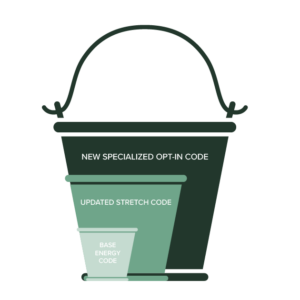Mapping Our Way Through the Massachusetts Energy Codes in 2025
Mapping Our Way Through the Massachusetts Energy Codes in 2025
Massachusetts is hurtling towards addressing climate change head on with the publishing of the updated ‘Stretch Building Energy Code’ and the new ‘Municipal Specialized Opt-in Stretch Energy Code’ to the Secretary of State register in December 2022. Watch out New York and California, Massachusetts is playing ball!
The Climate Act of 2021 set the stage for the updated energy codes. The Climate Act requires the Department of Energy Resources (DOER), in concert with the Board of Building Regulations and Standards (BBRS), to institute a new municipal Specialized Opt-in Stretch Code within 18 months. It also stipulates 50% greenhouse gas emission reductions by 2030, 75% by 2040, and Net Zero by 2050 in Massachusetts.
Not only did the DOER publish the new Specialized Opt-in Code on December 23rd, 2022, but it also released a draft of the “Municipal Fossil Fuel Free Building Construction and Renovation Demonstration Project”, which indicates the ten communities in Massachusetts prioritized to take part in the fossil fuel free regulation. On July 18th, 2023, the DOER released the finalized version. As of October 29, 2024, the DOER has accepted ten applications.
The updated energy codes are divided into three buckets, with each successive bucket filled with more requirements. The three buckets are an idea I recently contributed for the Boston Society for Architecture’s series on the updated energy codes.
The International Energy Conservation Code (IECC) is a model energy code, which forms the basis for the Massachusetts energy codes. The first bucket, the Base Energy Code, is the minimum required energy code in Massachusetts, which includes 50 towns and cities who have not adopted the Stretch Code. The second bucket, the Stretch Code, is a stricter option by municipal vote and 253 towns and cities have already voted to incorporate the code since the Stretch Code’s inception in 2009. The third bucket, the Specialized Opt-in Code, includes additional requirements (in addition to the Base and Stretch Code) and is available for municipal vote as of December 23rd, 2022. As of November 15th, 2024, 48 towns and cities have already voted to adopt the Specialized Opt-in Code. The DOER is also tracking the energy code adoption by municipality.
Base Energy Code
- 1
 0th Edition, IECC 2021 with MA Amendments
0th Edition, IECC 2021 with MA Amendments
- 50 municipalities have not voted to adopt the Stretch Code
- Concurrent until June 30, 2025, and effective starting July 1, 2025
- New Buildings, Existing Buildings
(or)
Updated Stretch Code
- IECC 2021 with MA Amendments + Stretch Code Amendments
- 253 municipalities have voted to adopt the Stretch Code
- Low-Rise Residential effective: January 1, 2023; Commercial effective: July 1, 2023
- New Buildings, Existing Buildings
(or)
New Specialized Opt-in Code
- IECC 2021 with MA Amendments + Stretch Code Amendments + Specialized Code Appendices
- 48 municipalities have voted to adopt the Specialized Opt-in Code
- Available for adoption by municipalities beginning on December 23rd, 2022
- Recommended Low-Rise Residential and Commercial effective date to be 6-11 months after adoption, starting the next July 1st or January 1st
- New Buildings (reference RC101.1 and CC101.4)
As a result, Massachusetts has a patchwork of energy codes across the state. Layer on the prioritized communities selected for the fossil fuel free demonstration regulations and this becomes even more complex. To help, we have created a live map that displays all municipalities in Massachusetts and their corresponding energy codes gathered from various sources. *
The map is embedded below and by moving your mouse over the map, you can see the effective Stretch Code and Specialized Opt-in Code date for each municipality. As the energy code becomes more stringent, the hue of green becomes stronger. The prioritized communities selected for participation in the fossil fuel free regulations are marked in purple. A few items to note, the effective date of each fossil fuel free community is determined by the individual town or city. For example, the fossil fuel free regulations in Brookline became effective February 20th, 2024. Lastly, if a municipality has already adopted the Stretch Code, the updated requirements will be automatic.
Cracking the Massachusetts Energy Code
Massachusetts has taken the road less traveled…
And that will make all the difference.
–Robert Frost
*The information contained herein is for educational purposes only but does not guarantee accuracy of the information as it relates to State energy codes or other local and regional energy and sustainability requirements, or the interpretation and application of those requirements. Please consult official documentation from State and Local agencies as applicable.
Sources:
The map is based on open-source software; the map data is from OpenStreetMap, the wiki of maps, and the municipal boundaries are taken from Mass GIS.
